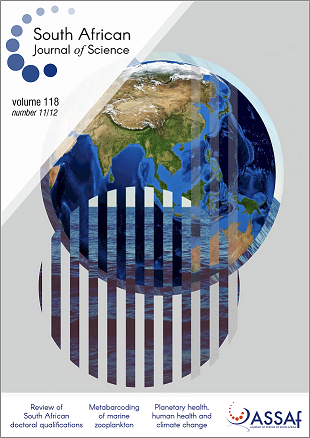Health in a post-COVID-19 world
DOI:
https://doi.org/10.17159/sajs.2022/14995Keywords:
new paradigms, post-COVID world, capacity for change, impediments, hopeAbstract
In the previous article in this issue (S Afr J Sci. 2022;118(11/12), Art. #13165), the emergence and spread of COVID-19 pari passu with climate change and planetary degradation were interpreted as late manifestations in the trend towards gradual decline into disorder (entropy) in an unstable and ecologically threatened planet. In this article, as we contemplate a post-COVID world, the question is whether new insights could generate courageous, prescient leadership towards new paradigms of health, politics, economics, society, and our relationship with nature. A gloomy prognosis is postulated because of the power of many impediments to such changes, both in an increasingly polarised world and in South Africa as a microcosm. Despite many squandered opportunities and a decline in local and global cooperation between all who have a stake in the future, some hope is retained for innovative shifts towards sustainable futures.
Significance:
Precarious local and global instabilities are vivid reminders of our interconnectedness with each other and with nature. Insights into local and global threats and opportunities, call for paradigm shifts in thinking about and taking action towards a potentially sustainable future in a country that has its own unique history and problems but is also a microcosm of the world. The impediments to making appropriately constructive paradigm shifts in many countries with their tendencies to authoritarianism that threaten peace and democracy, are even more complex in South Africa, where opportunities for dialogue and cooperation are diminishing. Retaining some hope, with vision and courage for innovative shifts towards a sustainable economic/ecological paradigm locally and globally, is arguably essential.
Downloads
Published
Issue
Section
License

All articles are published under a Creative Commons Attribution 4.0 International Licence
Copyright is retained by the authors. Readers are welcome to reproduce, share and adapt the content without permission provided the source is attributed.
Disclaimer: The publisher and editors accept no responsibility for statements made by the authors
How to Cite
- Abstract 581
- PDF 542
- EPUB 231
- XML 252
- Supplementary material 87












.png)